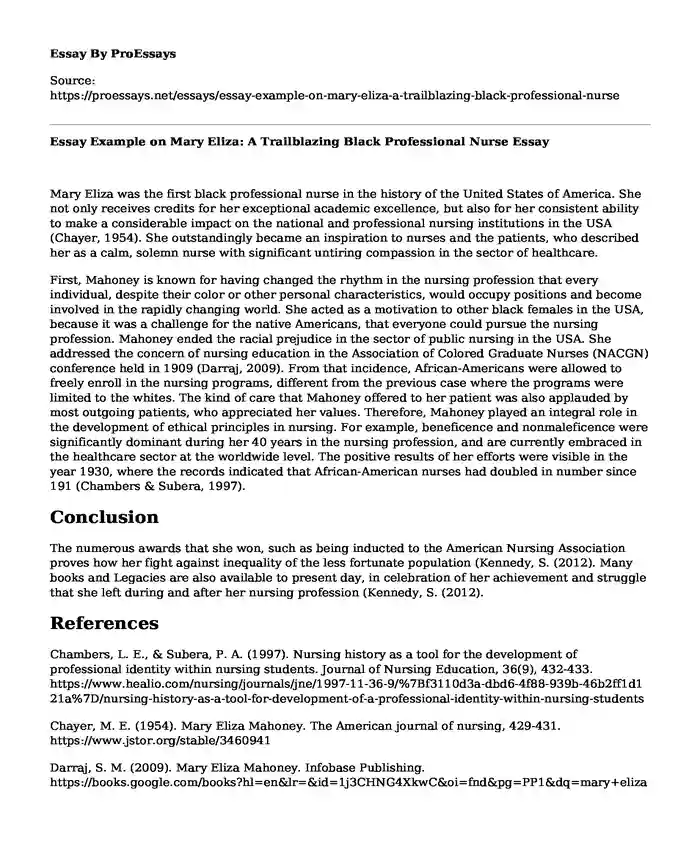Mary Eliza was the first black professional nurse in the history of the United States of America. She not only receives credits for her exceptional academic excellence, but also for her consistent ability to make a considerable impact on the national and professional nursing institutions in the USA (Chayer, 1954). She outstandingly became an inspiration to nurses and the patients, who described her as a calm, solemn nurse with significant untiring compassion in the sector of healthcare.
First, Mahoney is known for having changed the rhythm in the nursing profession that every individual, despite their color or other personal characteristics, would occupy positions and become involved in the rapidly changing world. She acted as a motivation to other black females in the USA, because it was a challenge for the native Americans, that everyone could pursue the nursing profession. Mahoney ended the racial prejudice in the sector of public nursing in the USA. She addressed the concern of nursing education in the Association of Colored Graduate Nurses (NACGN) conference held in 1909 (Darraj, 2009). From that incidence, African-Americans were allowed to freely enroll in the nursing programs, different from the previous case where the programs were limited to the whites. The kind of care that Mahoney offered to her patient was also applauded by most outgoing patients, who appreciated her values. Therefore, Mahoney played an integral role in the development of ethical principles in nursing. For example, beneficence and nonmaleficence were significantly dominant during her 40 years in the nursing profession, and are currently embraced in the healthcare sector at the worldwide level. The positive results of her efforts were visible in the year 1930, where the records indicated that African-American nurses had doubled in number since 191 (Chambers & Subera, 1997).
Conclusion
The numerous awards that she won, such as being inducted to the American Nursing Association proves how her fight against inequality of the less fortunate population (Kennedy, S. (2012). Many books and Legacies are also available to present day, in celebration of her achievement and struggle that she left during and after her nursing profession (Kennedy, S. (2012).
References
Chambers, L. E., & Subera, P. A. (1997). Nursing history as a tool for the development of professional identity within nursing students. Journal of Nursing Education, 36(9), 432-433. https://www.healio.com/nursing/journals/jne/1997-11-36-9/%7Bf3110d3a-dbd6-4f88-939b-46b2ff1d121a%7D/nursing-history-as-a-tool-for-development-of-a-professional-identity-within-nursing-students
Chayer, M. E. (1954). Mary Eliza Mahoney. The American journal of nursing, 429-431. https://www.jstor.org/stable/3460941
Darraj, S. M. (2009). Mary Eliza Mahoney. Infobase Publishing. https://books.google.com/books?hl=en&lr=&id=1j3CHNG4XkwC&oi=fnd&pg=PP1&dq=mary+eliza+mahoney+nursing+history+society&ots=SRbjstjc6g&sig=b_XEaPb7yxZ3nw_x7Y17Y-WGnj4
Kennedy, S. (2012). Research Guides: Black Nurses in History: A Bibliography and Guide to Web Resources: Mary Eliza Mahoney. http://libguides.rowan.edu/c.php?g=247991&p=1652665
Peer Response
Clara Burton is of the women who are recognized for having brought discoveries in the nursing profession, intending to extend healthcare services to everyone, despite their racial characteristics. I coincide with the colleague to outline that the American Red Cross helped in offering care to everyone, including the less fortunate. I can then suggest that Clara's primary intention of creating the American Red Cross was to reduce the instances of preventable death (Burton, 1995). Conventionally, people suffered from injuries, and minor brain disorder, but due to lack of enough income to travel to the healthcare centers, or seek the immediate assistance of federal First aid, they perished (Parish, 2013). That is why Clara was quick to suggest the introduction of ambulance brigaded and local fire police departments, which were mean to provide flexible medical supplies to save lives (Jones, 2012). In this case, Clara practiced in alignment with the ethical principles, beneficence, nonmaleficence, and justice, as she provided good quality care to everyone, was against the deaths, and never considered a different care plan, persons of a particular gender, sex, age, race, or religion.
References
Burton, D. H. (1995). Clara Barton: In the Service of Humanity: In the Service of Humanity. Praeger. https://books.google.com/books?hl=en&lr=&id=rJyTkPqIC-sC&oi=fnd&pg=PP11&dq=Burton,+D.+H.+(1995).+Clara+Barton:+In+the+Service+of+Humanity:+In+the+Service+of+Humanity.+Praeger.&ots=ceKo602oT-&sig=cWnkhyUMM95WYN1cf4iqBX4jrBs
Parish, P. J. (2013). Barton, Clara. In Reader's Guide to American History (pp. 89-112). Routledge.
Jones, M. M. (2012). The American Red Cross from Clara Barton to the New Deal. JHU Press.
Cite this page
Essay Example on Mary Eliza: A Trailblazing Black Professional Nurse. (2023, Sep 08). Retrieved from https://proessays.net/essays/essay-example-on-mary-eliza-a-trailblazing-black-professional-nurse
If you are the original author of this essay and no longer wish to have it published on the ProEssays website, please click below to request its removal:
- Thyroid Function Testing in Women Who Had a Stillbirth
- Essay on Patients & Physicians Perspectives on New Tech for CAN Detection in Diabetes Clinics
- Colonial Slave Labor: Issues and Implications - Essay Sample
- Essay Sample on Herbal Tea Powder: Unique Processing & Benefits for Health
- Paper Example on Prevalence and Support for Domestic Violence Survivors Presenting at Emergency Departments
- Essay Example on Nurses: Key Roles in Disaster Management Planning
- Essay Example on CDC's Accountability: Controlling the Spread of Hepatitis A (2017-2020)







